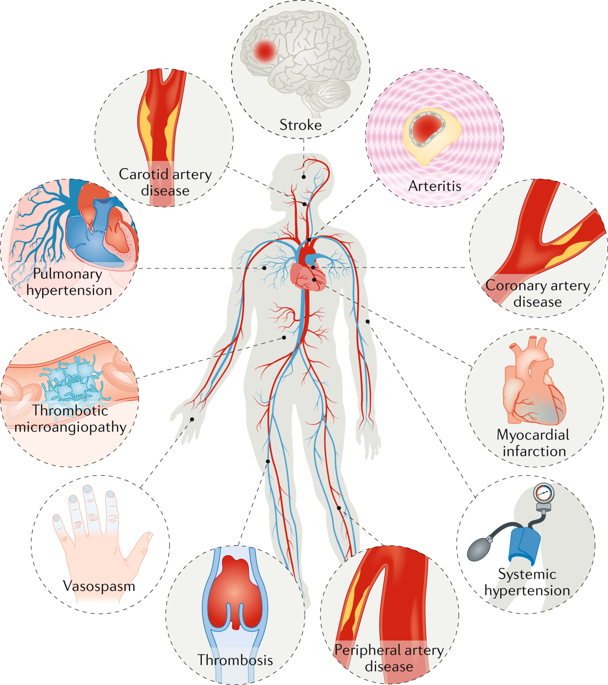Nature Reviews Cardiology ( IF 41.7 ) Pub Date : 2020-03-26 , DOI: 10.1038/s41569-020-0347-2 Joerg Herrmann 1

|
Cancer therapies can lead to a broad spectrum of cardiovascular complications. Among these, cardiotoxicities remain of prime concern, but vascular toxicities have emerged as the second most common group. The range of cancer therapies with a vascular toxicity profile and the clinical spectrum of vascular toxic effects are quite broad. Historically, venous thromboembolism has received the greatest attention but, over the past decade, the arterial toxic effects, which can present as acute vasospasm, acute thrombosis and accelerated atherosclerosis, of cancer therapies have gained greater recognition. This Review focuses on these types of cancer therapy-related arterial toxicity, including their mechanisms, and provides an update on venous thromboembolism and pulmonary hypertension associated with cancer therapies. Recommendations for the screening, treatment and prevention of vascular toxic effects of cancer therapies are outlined in the context of available evidence and society guidelines and consensus statements. The shift towards greater awareness of the vascular toxic effects of cancer therapies has further unveiled the urgent needs in this area in terms of defining best clinical practices. Well-designed and well-conducted clinical studies and registries are needed to more precisely define the incidence rates, risk factors, primary and secondary modes of prevention, and best treatment modalities for vascular toxicities related to cancer therapies. These efforts should be complemented by preclinical studies to outline the pathophysiological concepts that can be translated into the clinic and to identify drugs with vascular toxicity potential even before their widespread clinical use.
中文翻译:

癌症治疗的血管毒性作用。
癌症治疗可导致广泛的心血管并发症。其中,心脏毒性仍然是首要关注的问题,但血管毒性已成为第二常见的毒性类别。具有血管毒性特征的癌症治疗范围和血管毒性作用的临床范围相当广泛。从历史上看,静脉血栓栓塞受到了最大的关注,但在过去的十年中,癌症治疗的动脉毒性作用(可表现为急性血管痉挛、急性血栓形成和加速动脉粥样硬化)得到了更多的认识。本综述重点关注这些类型的癌症治疗相关的动脉毒性,包括其机制,并提供与癌症治疗相关的静脉血栓栓塞和肺动脉高压的最新信息。在现有证据、社会指南和共识声明的背景下概述了癌症治疗血管毒性作用的筛查、治疗和预防的建议。人们越来越认识到癌症治疗的血管毒性作用,进一步揭示了该领域在定义最佳临床实践方面的迫切需求。需要精心设计和良好实施的临床研究和登记,以更准确地确定与癌症治疗相关的血管毒性的发病率、危险因素、一级和二级预防模式以及最佳治疗模式。这些努力应该得到临床前研究的补充,以概述可以转化为临床的病理生理学概念,并在广泛临床使用之前识别具有潜在血管毒性的药物。











































 京公网安备 11010802027423号
京公网安备 11010802027423号